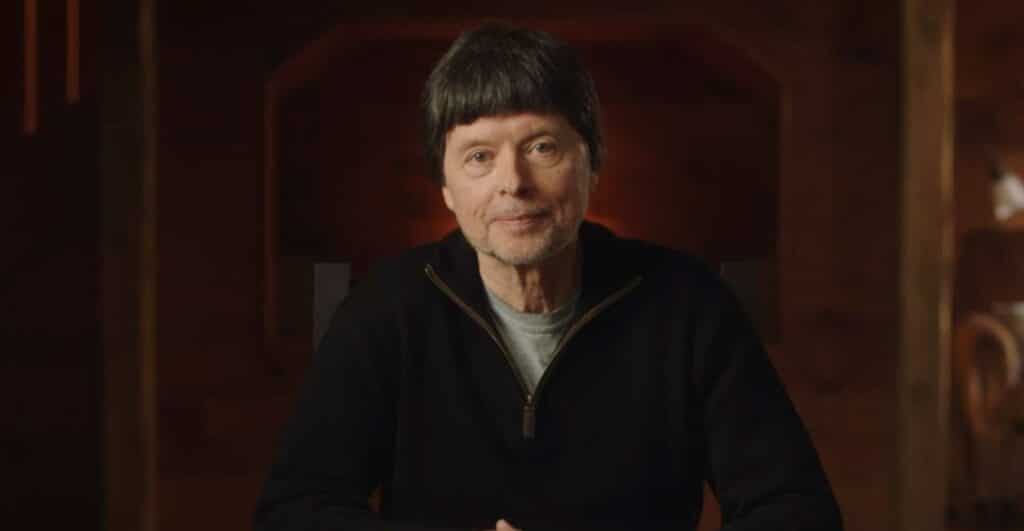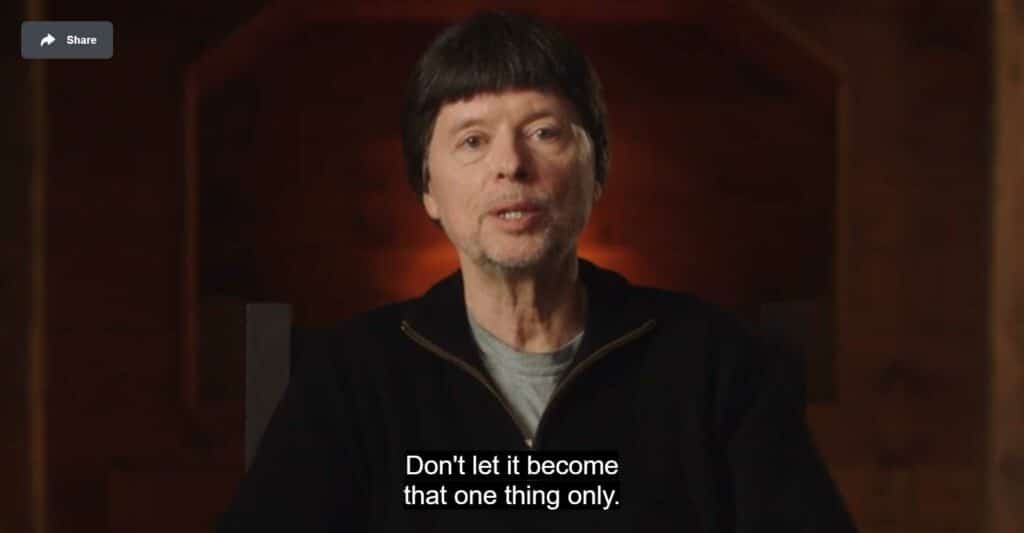Although I’m not a filmmaker, I’m always interested in learning more about the craft. After all, filmmakers are storytellers, too, and their way of finding ideas and bringing them to fruition can be rather inspiring.
So, when I spotted Ken Burns’ course on MasterClass, I knew I wanted to take it. He is one of the most prolific documentary filmmakers out there, so learning more about his creative process and mindset seemed like something I would benefit a lot from.
So, did his class meet my expectations, and what did I actually learn?
Is the class suited for absolute beginners, or is some previous experience required to fully enjoy it?
I’ll answer all of these questions and tell you more about the course’s content, highlights, and potential drawbacks in a bit.
Table of Contents
What is the Ken Burns MasterClass?
“Ken Burns Teaches Documentary Filmmaking” is an online course offered by MasterClass, a popular learning platform known for its team of well-known instructors.
Ken Burns is an American filmmaker and historian known for his documentary films and television series that deal with American history and culture. He is responsible for directing and producing some of the most acclaimed historical documentaries ever made, including The Civil War, Baseball, The Vietnam War, and The Roosevelts.
As is usually the case with MasterClass courses, Ken Burns’ course is focused on the instructor’s personal approach to filmmaking. Burns talks about how he finds stories, shapes characters, structures a narrative, accesses archive material, and much more.
In other words, he teaches how to bring history to life – the very skill he is a master of, and he does so in a highly engaging, unconventional way.
The course contains 26 video lessons with a duration of 4 hours and 56 minutes.

Who is Ken Burns?
Ken Burns is one of the most famous documentary filmmakers in the industry.
With a career spanning over 40 years, he is responsible for making acclaimed historical documentaries like The Civil War, Baseball, Jazz, The Statue of Liberty, The War, The National Parks: America’s Best Idea, The Roosevelts: An Intimate History, and The Vietnam War.
He is also regarded as one of the most influential and innovative filmmakers of our time. There’s even an effect named after him, the Ken Burns effect, which enables users to digitally pan across and zoom into or out of a still photograph. Although Ken doesn’t even give himself credit for inventing the technique, this inevitably became his signature style.
Ken’s films have been honored with numerous awards, including Emmy Awards, Grammy Awards, and two Academy Award nominations. In 2008, he also received a Lifetime Achievement Award from the Academy of Television Arts & Sciences.
Who is Ken Burns’ MasterClass for?
Since the course covers the basic techniques and movie-making tools, it’s ideal for beginners and film students who want to solidify their knowledge and learn something new.
On the other hand, Ken’s approach is unique and rather unconventional. As he says in the course, he wants to break free from the “tyranny of conventional wisdom” and share what he learned through experience so you can find your own road.
That said, Ken’s class brings many benefits to more experienced filmmakers and directors as well.
After all, we’re talking about a legendary filmmaker, so even if you have years of experience under your belt, hearing some honest advice from him definitely wouldn’t hurt. Quite the contrary – Ken’s lessons can help you gain new perspectives and find new ideas.
Finally, speaking from my own experience, Ken’s class can be interesting to any creative. Writers, storytellers, artists, even actors – anyone who wants to learn more about shaping characters, writing a script, and using audio and visual storytelling to create something valuable.
I personally found it compelling and inspiring, even though I’m not a filmmaker.
To sum things up, here are some of the people who would benefit the most from Ken’s class:
- Aspiring documentary filmmakers
- Beginners
- Creatives
- Admirers of Ken Burns’ work
What does Ken Burns' MasterClass cover?
In short, Ken Burn’s MasterClass covers the entire process of making a documentary film.
To be more precise, it shows what the filmmaking process looks like in Ken Burns’ eyes.
Ken starts with lessons on finding ideas and choosing a story and walks you through the stages of preparation, filming, editing, and sharing your film with an audience.
He teaches how to create meaning through juxtaposition and talks about footage, sound design, interviews, writing, and other elements that need to work in interrelationship with each other in order to result in a successful film.
The course also includes several case studies, so you can get a more detailed look at some of Ken’s films and techniques.
Here is what you can expect from each lesson in terms of topics:
- Lesson 1 is an introductory lesson where Ken introduces himself and the course.
- Lesson 2 features Ken’s experiences and advice for navigating the filmmaking process.
- Lessons 3-4 cover the process of choosing a topic, story, and sources.
- Lesson 5 breaks down Ken’s process of sculpting stories and narratives.
- Lesson 6 covers treatments, pitching, and funding.
- Lesson 7 includes Ken’s tips on how to structure a narrative in an effective way.
- Lesson 8 is focused on sourcing archival materials and collecting rare audio and visual materials.
- Lesson 9 deals with shaping memorable nonfiction characters.
- Lesson 10 is a case study lesson where Ken breaks down The Vietnam War episode and teaches how to structure a film.
- Lesson 11 is focused on crafting a script.
- Lessons 12-13 cover visual storytelling and the use of various cinematic techniques.
- Lessons 14-16 deal with interviews. Ken explains how to select interview subjects, conduct an interview, and overcome challenges.
- Lesson 17 is focused on nonfiction cinematography. Ken teaches how to approach interviews and shoot with a lean crew.
- Lesson 18 deals with music as a powerful storytelling tool.
- Lessons 19-21 cover the editing process and principles. There’s also a case study with never-before-seen-cuts of The Vietnam War.
- Lessons 22-23 break down the voice-over process and sound design.
- Lesson 24 contains Ken’s thoughts on the responsibility and role of a filmmaker in our society.
- Lesson 25 covers the final part of making a film: sharing it with the audience.
- Lesson 26 includes Ken’s final thoughts and advice.
My favorite parts of Ken Burns' MasterClass
Honestly, this is one of the best filmmaking courses I’ve taken so far.
I didn’t know what to expect at first, because in the introduction, Ken pointed out that there’s no guide to writing a screenplay, and that you simply have to jump into the deep end to acquire the necessary skills.
Nevertheless, he managed to do quite the opposite – to guide me, step-by-step, through his filmmaking process.
Ken certainly turned out to be a phenomenal teacher, and each lesson provided me with some food for thought.
Although it’s hard to pick the best parts, here are some of my personal favorites.
What it takes

Ken speaks in a very direct and honest way in this lesson, explaining what it takes to be a successful filmmaker.
As Ken suggests, you should know many different things and become a jack of all trades. You also need to be ready for all sorts of challenges and problems.
But first, you need to set your creative goals and determine what you are willing to give up for your art. And you need to keep at it – persistence is the key.
Case study: The Vietnam War Episode Boards

In this case study, Ken shows the episode boards of his docuseries, The Vietnam War.
By putting topics, segments, and clips on colorful post-its, Ken is able to visualize the structure of the episode and determine whether it’s versatile enough.
This practice can also help you balance larger themes with individual stories.
The artist's responsibility

According to Ken, the artist’s responsibility is to lead people into hell and then lead the way out. He doesn’t believe that it’s enough to just show the hell; people should generally be more critical about themselves.
He also believes that moral differences should be able to coexist in a film, and that’s what he tried to do in The Civil War. He demonized slavery, as it deserves to be, but he also wanted to show what really happened and that interesting people populated both sides.
And as he says in the conclusion, it’s possible to create an environment in which lots of opposing views can coexist.
How much does the MasterClass cost?
MasterClass is a subscription-based learning platform, so it’s not possible to purchase courses individually. If you want to take this MasterClass, you have to become a subscriber.
The standard annual plan has been renamed "Plus" and is available at $120 a year (which makes it $10 per month, billed annually), and now provides access to all MasterClass courses on two devices instead of one. The Premium plan, providing access for up to six devices costs $240 per year.
A MasterClass subscription gives you unlimited access to a catalog of 200+ classes, so if you want to take multiple classes throughout the year, the subscription is definitely worth it, and there are pleny of interesting courses on related topics to explore.
Also, the platform offers a 30-day satisfaction guarantee, so if you’re not happy with your learning experience, you can request a full refund.
Note that the "Standard" membership, priced at $72 per year, only gives you access to their short-form learning content – none of their full MasterClasses are included.
What I liked about Ken Burns' MasterClass
As you probably already assumed, I genuinely enjoyed Ken’s class. It’s highly informative and immersive, providing a bunch of tips and inspiration for aspiring filmmakers and creatives.
And if you want to expand your knowledge, the accompanying PDF class guide contains additional reading suggestions.
Now, here are some of the reasons why I liked the course and why I would recommend it to anyone interested in documentary filmmaking.
Learning from a legendary filmmaker
Needless to say, Ken Burns is a master of his craft. He has been in the industry for more than 40 years, so he has a lot of interesting stories to share.
But it’s not only about what he shares but how he does it. He is obviously a natural storyteller, and his skill of telling a story in a compelling way goes beyond film. His lessons are packed with emotion, friendly advice, and thought-provoking ideas, yet they are understandable and easy to follow.
Finally, the excitement and passion Ken feels towards his projects and ideas are contagious, and if you’re an artist, catching that inspiration bug after watching this course is almost inevitable.
Unconventional lessons
You get warned that this isn’t a conventional filmmaking course at the very beginning. In fact, Ken wants you to ‘reset’ and start this course with a fresh and open mind. That’s how I understood his introduction, at least.
In any case, Ken doesn’t stick to traditional filmmaking rules and expectations in his teaching. However, he does value the laws of storytelling.
Useful case studies
Case studies are always a great way to add more excitement and change of pace to an online course.
By delving deeper into some of his films, projects, and tools, Ken shows the intricacies of his storytelling method and, as he does with his movies, brings history alive.
Top-notch production quality
Once again, MasterClass delivered a well-produced, beautifully shot video course to their learners.
The setting is fitting, the music is good, and the clips from Ken’s films are nicely incorporated.
Drawbacks of Ken Burns' MasterClass
Just like any other MasterClass, Ken’s course is not for everyone. Here are some of the aspects of it that might not suit some learners.
It's a bit overwhelming
The downside of taking a detailed, lengthy course is that it can get a bit overwhelming. There are so many things to unpack here, and while that’s generally an advantage, it did take me a while to get used to the atmosphere and the pace of the course.
Ken’s ideas and explanations were, at times, all over the place, so if I wanted to take notes, I needed to pause the video.
And I needed to break the course into chunks.
In any case, this really isn’t a significant disadvantage, and I think having such a well-rounded, insightful filmmaking course is ultimately a good thing. But it all depends on your learning habits and preferences.
Review conclusion: Is Ken Burns' MasterClass worth it?
At the end of the day, I think Ken Burns’ course is definitely worth taking, especially if you’re already subscribed to MasterClass.
The course is broken up into 26 video lessons, covering the entire process of making a documentary film, including finding a story, interviewing, writing a script, sourcing materials, and editing.
However, this isn’t a classic how-to guide – it’s a thorough portrayal of Ken Burns’ personal approach to filmmaking. And in a way, quite an inspiring and emotional one.
Of course, that doesn’t mean that the course is not informative. It’s actually very insightful and useful, providing examples, multiple case studies, and practical advice.
That said, I would recommend Ken’s class to anyone interested in documentary filmmaking, as well as fellow creatives and artists who want to get inspired by one of the greatest documentary filmmakers of our time.
For a limited time, up to 50% off your subscription.




